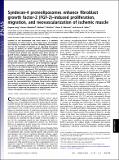| dc.contributor.author | Jang, Eugene | |
| dc.contributor.author | Albadawi, Hassan | |
| dc.contributor.author | Watkins, Michael T. | |
| dc.contributor.author | Edelman, Elazer R. | |
| dc.contributor.author | Baker, Aaron B. | |
| dc.contributor.author | Langer, Robert | |
| dc.date.accessioned | 2012-07-26T19:07:27Z | |
| dc.date.available | 2012-07-26T19:07:27Z | |
| dc.date.issued | 2012-01 | |
| dc.date.submitted | 2011-11 | |
| dc.identifier.issn | 0027-8424 | |
| dc.identifier.issn | 1091-6490 | |
| dc.identifier.uri | http://hdl.handle.net/1721.1/71851 | |
| dc.description.abstract | Ischemia of the myocardium and lower limbs is a common consequence of arterial disease and a major source of morbidity and mortality in modernized countries. Inducing neovascularization for the treatment of ischemia is an appealing therapeutic strategy for patients for whom traditional treatment modalities cannot be performed or are ineffective. In the past, the stimulation of blood vessel growth was pursued using direct delivery of growth factors, angiogenic gene therapy, or cellular therapy. Although therapeutic angiogenesis holds great promise for treating patients with ischemia, current methods have not found success in clinical trials. Fibroblast growth factor-2 (FGF-2) was one of the first growth factors to be tested for use in therapeutic angiogenesis. Here, we present a method for improving the biological activity of FGF-2 by codelivering the growth factor with a liposomally embedded coreceptor, syndecan-4. This technique was shown to increase FGF-2 cellular signaling, uptake, and nuclear localization in comparison with FGF-2 alone. Delivery of syndecan-4 proteoliposomes also increased endothelial proliferation, migration, and angiogenic tube formation in response to FGF-2. Using an animal model of limb ischemia, syndecan-4 proteoliposomes markedly improved the neovascularization following femoral artery ligation and recovery of perfusion of the ischemic limb. Taken together, these results support liposomal delivery of syndecan-4 as an effective means to improving the potential of using growth factors to achieve therapeutic neovascularization of ischemic tissue. | en_US |
| dc.language.iso | en_US | |
| dc.publisher | National Academy of Sciences of the United States of America | en_US |
| dc.relation.isversionof | http://dx.doi.org/10.1073/pnas.1117885109 | en_US |
| dc.rights | Article is made available in accordance with the publisher's policy and may be subject to US copyright law. Please refer to the publisher's site for terms of use. | en_US |
| dc.source | PNAS | en_US |
| dc.title | Syndecan-4 Proteoliposomes Enhance Fibroblast Growth Factor-2 (FGF-2)-induced Proliferation, Migration, and Neovascularization of Ischemic Muscle | en_US |
| dc.type | Article | en_US |
| dc.identifier.citation | Jang, E. et al. “Syndecan-4 Proteoliposomes Enhance Fibroblast Growth Factor-2 (FGF-2)-induced Proliferation, Migration, and Neovascularization of Ischemic Muscle.” Proceedings of the National Academy of Sciences 109.5 (2012): 1679–1684. Copyright ©2012 by the National Academy of Sciences | en_US |
| dc.contributor.department | Harvard University--MIT Division of Health Sciences and Technology | en_US |
| dc.contributor.approver | Edelman, Elazer R. | |
| dc.contributor.mitauthor | Jang, Eugene | |
| dc.contributor.mitauthor | Edelman, Elazer R. | |
| dc.contributor.mitauthor | Langer, Robert | |
| dc.relation.journal | Proceedings of the National Academy of Sciences of the United States of America | en_US |
| dc.eprint.version | Final published version | en_US |
| dc.type.uri | http://purl.org/eprint/type/JournalArticle | en_US |
| eprint.status | http://purl.org/eprint/status/PeerReviewed | en_US |
| dspace.orderedauthors | Jang, E.; Albadawi, H.; Watkins, M. T.; Edelman, E. R.; Baker, A. B. | en |
| dc.identifier.orcid | https://orcid.org/0000-0002-7832-7156 | |
| dc.identifier.orcid | https://orcid.org/0000-0003-4255-0492 | |
| mit.license | PUBLISHER_POLICY | en_US |
| mit.metadata.status | Complete | |
